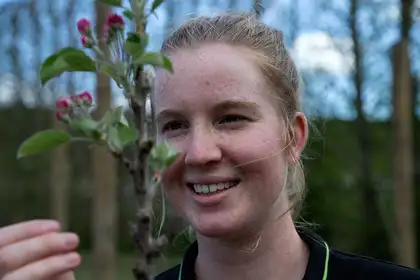
Sarah Ross.
Third-year Bachelor of Science (Agricultural Science) student Sarah Ross hopes to one day be making her own craft chocolate with her own home-grown cacao, but her ambition doesn’t stop there.
Before Miss Ross makes her fortune as a chocolatier, she wants to use her study to give back through development work in other countries who grow the bean. “I’d really like to work in cacao growing regions, working with people growing the beans, to first learn from them, then work together with them to help improve their own yields and quality to make their businesses more profitable”.
Not be confused with cocoa, cacao comes from the same pod of the same tree, but differ in the way they are processed and heated when being made into powder, retaining more antioxidants.
To support these dreams, Miss Ross chose to major in agricultural science and minor in horticultural science.
“I chose a horticultural science minor after my uncle, who owns and manages his own kiwifruit orchard, convinced me horticulture was the place to be; I have never looked back since. There are so many more opportunities, people pushing you into the industry to get as much experience as possible. I've really enjoyed it.”
“At the moment there are too many jobs advertised for graduates; my classmates have their pick of the bunch. We keep hearing over and over again that the industry is crying out for graduates and skilled labour. Growth cannot continue if people aren’t there to sustain it. So, for anyone I talk to that enjoys biological sciences plus a mix of office and field work, I’d tell them to strongly consider a career in horticulture”.
The treasurer of the Massey Hort Society, Miss Ross says that the horticulture culture is small but close-knit. “The horticulture degree is very small, but it means it has a personal feel about it and everyone knows everyone. Our lecturers are really enthusiastic and are always trying their best to connect you with all the industry opportunities available”.
Growing up near Pukekohe, Miss Ross has also taken to Palmerston North. “I like the campus, its proximity to the city, and how cheap my rent is!”.
Life has been made a little easier by several scholarships she has received over her time at university, including two $4,500 scholarships from HortNZ.
She has also had the opportunity to attend industry conferences, including the Horticulture Conference in 2016, and Fresh Connections 2017, held in Adelaide, the latter of which she described as her best experience at university. “It was so scary to think I’d be flying over to Adelaide to attend the biggest horticulture conference in Australia but in the end it was such an amazing opportunity, definitely worth spending a few hours on an application for!”.
Like many of us, she describes university as a lot of practice writing reports and assignments, but comments there are lots of opportunities to get hands on. “We have quite a few field trips, depending on the papers you take, where we’ll visit an orchard or business and have to write a report or do analysis on it. I’d say pretty much all of the main science papers ag and hort students take have lab components so we definitely don’t just sit in lectures all day”.
Once her undergraduate study is complete she plans to complete a Masters of Science in Horticulture, her thesis focusing on the sensory and chemical aspects of potato flavour.